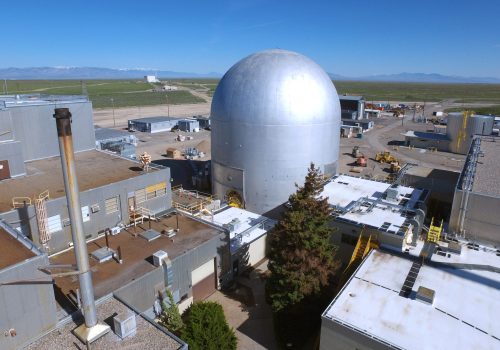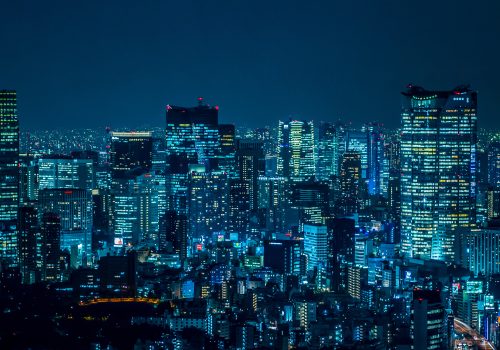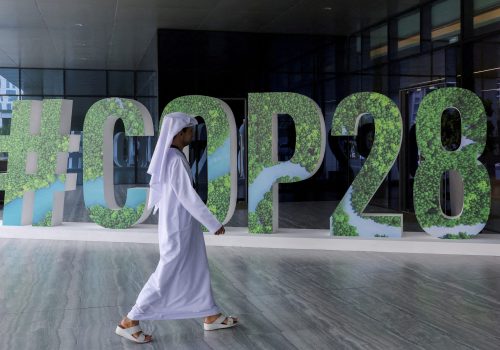The world’s biggest energy exporters plot out the next steps toward net zero
Watch the event
A day after more than fifty oil and gas companies pledged to cut methane emissions to nearly zero by 2030, key leaders of the Net-Zero Producers Forum laid out a significant collaborative vision from some of the world’s largest energy exporters for making significant progress on the world’s sustainability goals.
“We have a lot of what we need to make the progress that is essential,” Rachel McCormick, director general of International and Intergovernmental Affairs at Natural Resources Canada, said at the Atlantic Council’s Global Energy Forum at COP28.
“My hope is that the next time we’re together on this stage, we’ll say that we’ve gotten where we want to go: to 75 percent reduction. That there is no question on whether or not we’re on that pathway [to net-zero emissions] by 2030.”
McCormick wasn’t alone in that belief. She was joined at the Global Energy Forum in Dubai by Andrew Light, assistant secretary of International Affairs at the US Department of Energy, and Khalid al-Mehaid, chief negotiator for the climate agreements for the Kingdom of Saudi Arabia.
Their nations, plus Norway, Qatar, and the United Arab Emirates, comprise the Net-Zero Producers Forum, a not-yet-three-year-old collaboration of six nations that collectively represent more than 40 percent of global oil and gas production. The group is designed to work together on pragmatic net-zero emission solutions—everything from methane abatement to clean-energy and carbon capture/storage technologies to advancing the circular carbon economy approach.
Their work is particularly meaningful in light of Monday’s launch of the COP28 Global Methane Pledge Ministerial, which announced more than one billion dollars in new grant funding for methane action (more than triple current levels of spending). plus new data tools and new membership that grew participation to 155 governments worldwide.
Read on for more highlights from their conversation with Angela Wilkinson, secretary general and chief executive officer of the World Energy Council.
The challenge and opportunity of tackling methane
- Light said that the pledges made at the ministerial wouldn’t have been possible without the relationships built through the Net-Zero Producers Forum, which forged unlikely partnership opportunities between the six energy-exporting nations. “Bringing our countries together was a necessary condition for something like that making it over the finish line just a few years later.”
- One of the key efforts of the Net-Zero Producers Forum, originally launched at US President Joe Biden’s first Climate Leaders Summit in April 2021, has been the creation of the Upstream Methane Abatement Toolbox. The toolbox provides information on measures taken so far, and lessons learned, in implementing methane-abatement technologies and policies, creating a roadmap for others to follow.
- Establishing a global framework around addressing methane emissions is particularly difficult. Past initiatives to curb extreme pollutants were plugged into ready-made global frameworks, such as the efforts to eliminate hydrofluorocarbons (HFCs): “There we were very lucky because we had the [1987] Montreal Protocol that was already tailor-made,” Light said. “Reducing methane is a way you can get near-term relief on global warming, but… we don’t have a working agreement, and so it’s much more difficult to take on from a global political perspective.”
Weighing economic competitiveness against net-zero goals
- The stakes around sustainable energy couldn’t be higher, Light said: “If we get it right, then we get a solution to the biggest problem that we all face today. We get the creation of hundreds of thousands, if not over a million, new jobs. We get a cleaner planet. We get a more sustainable future.” And if they get it wrong? “We lose everything we have gained. We lose all developmental gains we’ve had since World War II.”
- Particularly when it comes to major energy-exporting economies, it’s important to craft widely inclusive climate change strategies. “If it wasn’t for the way that the Paris Agreement was inclusive enough and wide enough for all of us to manage our national circumstances, we wouldn’t have been party to that dream,” al-Mehaid, the Saudi Arabian chief negotiator, said.
- Saudi Arabia and other oil-rich nations like it have adopted broad diversification strategies that innovate how oil and gas are used, including diverting those resources into noncombustion-focused products, such as replacements for cement and aluminum. “It gives you a long-term hedge,” al-Mehaid said, against the uncertain energy economy that a net-zero future could bring.
Other advances for fighting global warming
- Canada has passed tax credits and other financial incentives for companies willing to reduce their emissions, from a carbon price set across its entire economy to 65 percent expenditures returned for carbon-dioxide removal (CDR) efforts and 35 percent returned for energy-efficient transportation and other measures. “Carbon capture is really important because we know it works, we just need to scale it,” McCormick said.
- She added that it was important for the Net-Zero Producers Forum to consider its strengths when working together, rather than trying to tackle every climate-related challenge all at once. “There is a reason these countries came together. You don’t want to do everything. You want to do what is special to you. What are the results that can drive actions [and] send signals to the international market? The fact that we are all net exporters is important.”
- That mindset is one reason why all the countries in the Net-Zero Producers Forum have agreed to support direct air capture initiatives that extract CO2 from the atmosphere, but may not necessarily work together on proposing nature-based solutions, such as protecting forests or wetlands—particularly since the six nations have significant geographic and environmental differences. “Everything that comes together has to justify itself in this incredibly crowded landscape we see now on cooperation. The virtue here is that we have a similar approach,” Light said.
Nick Fouriezos is a writer with more than a decade of journalism experience around the globe.
Watch the full event
Further reading
Tue, Dec 5, 2023
A new generation of nuclear reactors is poised to set the United States—and the world—on the path to net zero
Global Energy Agenda By
Over the next decade, more than a dozen advanced reactor concepts will be demonstrated in the United States. Ensuring the advancement of this nuclear energy will be critical to securing security, prosperity, and environmental sustainability for future generations.
Thu, Nov 30, 2023
To achieve carbon neutrality, countries must navigate geopolitics and energy together
Global Energy Agenda By
Energy dynamics, replete with their occasional turbulence, hold sway over global geopolitics. As such, multilateralism will be a key driving force to encourage energy transitions toward net zero.
Thu, Nov 30, 2023
Expert analysis: The successes and shortcomings in the fight against climate change at COP28
New Atlanticist By
Our experts dispatched to Dubai, where they analyzed how global leaders responded to the greatest challenges posed by climate change.
Image: A discussion about the Net-Zero Producers Forum at the Global Energy Forum at COP28, December 5, 2023.



